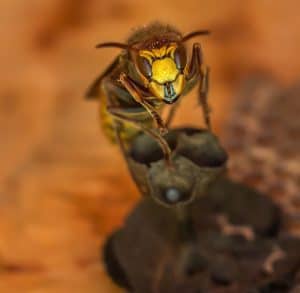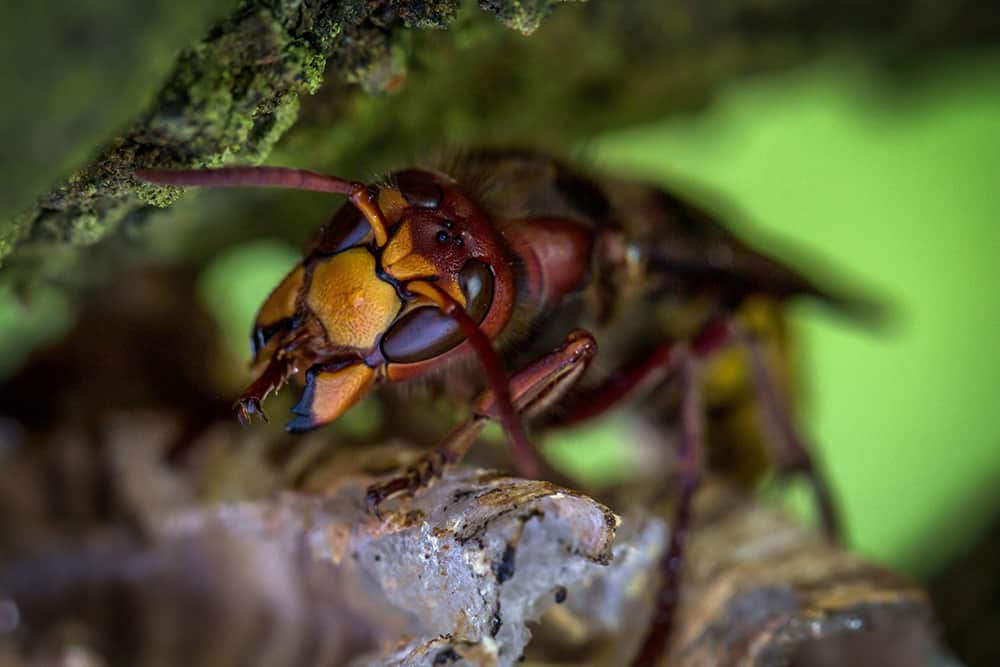Hornets Eat Honey Bees – Did you know hornets like to eat honey bees and are actually a breed of social wasps that live in highly organized colonies, known to have a rich diet of sugar & protein.
Hornets prefer honey bees to any other insect and are the primary source of food to fuel their queens and colonies.
Honey bees provide a great source of protein and also the sweet, golden sugary goodness which hornet’s adore – honey! Unfortunately, it only takes a small number of giant hornets to wipe out an entire honey bee colony. Their dominating size means one giant hornet can kill roughly 40 honey bees in sixty seconds.
Hornet vs honey bee
Hornets strategically stalk and prey on honey bees outside the entrance of the hive.
Hornets hover in front of hives waiting to kill as the bees return to their colony. The aggressive hornets bite off the heads of the honey bees and leave the head and limbs behind. Not a pleasant thought right!? This behavior is called “hawking” an opportunist feeding technique. Above all, after the hornet kills and dismembers the bee, they return back to the hornet hive with the remainder of the honey bee body and use it to feed the queen and nourish the hive.

European Hornet
The Japanese Honey Bee
There’s only one bee in the entire world that can defend hornets – the Japanese Honey Bee.
Unique to all other bees, the Japanese honey bee has developed a sly tactic to stop these hornet predators from wiping out their colonies.
First of all, as a hornet spy approaches the hive, the honey bees attack it before it can release any pheromones to attract partnering invaders. In addition, a honey bee’s sting and bite is no match for a hornet, so instead they swarm around the isolated hornet, vibrating their bodies at a tremendous rate. As a result, the vibration from the bees causes the temperature to drastically rise, roasting the hornet alive!
Furthermore, this technique called “bee-balling” is the result of evolution over hundreds of years. Honey bees from the rest of the world have yet to discover this defense mechanism, making them prime targets to giant hornets as they make their way across the globe.
Most noteworthy, there are over 20 different species of hornets around the world, but only a few are commonly found infesting areas in the United States.
Pest Solutions And Services In Greater Nashville, Tennessee
Finally, at U.S. Pest Protection, we protect what matters most… the family, home, and of course the honey-bees. Due to the aggressiveness of hornets and the harm they may do to your bee hives, as well as your outdoor living environment, we strongly recommend contacting a pest professional to take care of all your pest control needs. At U.S. Pest, we know the importance of protecting and saving our honey bees. As a result, call us today at 615-590-1260, or go to www.uspest.com for more information about our pest control programs. Also, learn more about the public awareness initiatives we are taking to help save Tennessee honey bees and other local pollinators.
Connect With U.S. Pest
Keep up with the latest pest news at uspestnews.com. Connect and follow us on social media! Facebook | Twitter | Instagram | LinkedIn or YouTube. Need our services? Contact Us today!

